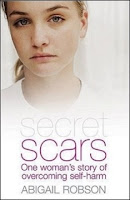Mental Health Awareness Week
This week has been Mental Health Awareness Week, so it seems only fitting that I should write something about mental health, seeing as it’s a bit of a specialist subject of mine. Over the years I’ve had the privilege of working with people struggling with eating disorders and self harm, but I also come at it from the other side because I have bipolar disorder. I’m stable at the moment, praise God, but it’s not something I can guarantee will always be the case.
 For me, writing and my mental health have always been inextricably linked. I started out my writing career with a memoir of my own battles with self-harm, but I’ve written since before the book-seed was even geminated. I wrote about my feelings, my experiences, about life, faith and God. From a very young age writing was, first and foremost, a form of catharsis I couldn’t get from anything else. Cathartic writing is rarely for pubic reading (see my first ever ACW blog post), but writing feelings out rather than keeping them in has saved me from imploding numerous time.
For me, writing and my mental health have always been inextricably linked. I started out my writing career with a memoir of my own battles with self-harm, but I’ve written since before the book-seed was even geminated. I wrote about my feelings, my experiences, about life, faith and God. From a very young age writing was, first and foremost, a form of catharsis I couldn’t get from anything else. Cathartic writing is rarely for pubic reading (see my first ever ACW blog post), but writing feelings out rather than keeping them in has saved me from imploding numerous time.
Another thing I glean from writing when unwell is that it can lead to wonderful material. A section of my first book was taken verbatim from a journal, and there was one chapter I wrote in its entirety whilst severely depressed. That’s not to say that all the writing I do when unwell is good. In fact most of it isn’t. When I’m manic I think I’m a literary genius and am in danger of thinking that everything that comes out is a masterpiece. When I’m depressed it feels like any vision I once had is gone and I’ll never write well again. But, through it all, if I keep writing I will always have something of substance to work with in the end.
Thirdly, when my bipolar is causing problems, paper and pencil are the only way I can really express myself - writing it down can say to myself and others ‘this is how it feels’. I see writing about my own situation as a ministry, to explain to others what mental illness is like. I often use the words other people find difficult to say - in fact my best ever readership was of a post about suicide (which you can find here).
Lastly, it’s not just about catharsis, material or expression. Looking back over the many notebooks, journals, scarps of paper, and backs of napkins, I can see where my mood has been, and sometimes where it might be going. Often, people talk about journalling as a spiritual practice, but for me, journalling is a self-care strategy. It’s an emotional log whereby I can see what might be happening with my mood, which, alongside medication, helps keep me stable.
Through everything, writing has been my mainstay, my first port of call. Whether it’s been by journalling feelings out or having a deadline that needs me to overcome my illness for a while, writing is always there, and as long as I can hold a pencil, that’s what you’ll find me doing.
If you want to know more about bipolar disorder or other mental health conditions, go to the Mind or ThinkTwice websites.
 Abbie has been writing ever since she could hold a pencil. She wrote a memoir, Secret Scars, (Authentic, 2007), and later, Insight Into Self-Harm (CWR, 2014). She founded and directs Adullam Ministries, an information and resource website and forum about self-harm and related issues. She blogs at Pink and Blue Mummyland and tweet as @AbbieRobson and @AdullamSelfHarm. She lives in Rugby with husband John and two children.
Abbie has been writing ever since she could hold a pencil. She wrote a memoir, Secret Scars, (Authentic, 2007), and later, Insight Into Self-Harm (CWR, 2014). She founded and directs Adullam Ministries, an information and resource website and forum about self-harm and related issues. She blogs at Pink and Blue Mummyland and tweet as @AbbieRobson and @AdullamSelfHarm. She lives in Rugby with husband John and two children.
 Abbie has been writing ever since she could hold a pencil. She wrote a memoir, Secret Scars, (Authentic, 2007), and later, Insight Into Self-Harm (CWR, 2014). She founded and directs Adullam Ministries, an information and resource website and forum about self-harm and related issues. She blogs at Pink and Blue Mummyland and tweet as @AbbieRobson and @AdullamSelfHarm. She lives in Rugby with husband John and two children.
Abbie has been writing ever since she could hold a pencil. She wrote a memoir, Secret Scars, (Authentic, 2007), and later, Insight Into Self-Harm (CWR, 2014). She founded and directs Adullam Ministries, an information and resource website and forum about self-harm and related issues. She blogs at Pink and Blue Mummyland and tweet as @AbbieRobson and @AdullamSelfHarm. She lives in Rugby with husband John and two children.

God is so good to give us this outlet for overwhelming feelings. I often write when I pray. I often don't know what I want to pray until I write it.
ReplyDelete